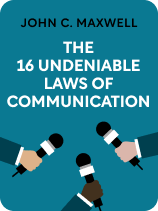

This article is an excerpt from the Shortform book guide to "The 16 Undeniable Laws of Communication" by John C. Maxwell. Shortform has the world's best summaries and analyses of books you should be reading.
Like this article? Sign up for a free trial here.
Do you tend to see the best in people? Is it easy for you to open up to others, even strangers? Do you make people laugh (with you, not at you)?
John C. Maxwell estimates that he’s spoken over 13,000 times throughout his career, and he shares his wisdom in his book The 16 Undeniable Laws of Communication. He recommends that, as you prepare to speak, you figure out your strengths so you know how to play to them.
Read on to learn about four public speaking strengths and how to determine your own.
Your Natural Public Speaking Strengths
Before you write your message, it may be helpful to identify your natural public speaking strengths so you can build them into your presentation. While learning from other speakers can give you techniques and methods to experiment with, you should write your message in your own voice. If you try to take an approach that doesn’t come naturally to you, like revealing a personal story that you’re not comfortable sharing, you risk losing your connection with your audience.
(Shortform note: You may write your message in your own voice. But, if you’re anxious about public speaking, you may find it difficult to express yourself with authenticity once you’re on stage. In Talk Like TED, Carmine Gallo argues that to overcome your anxiety and uncover your natural strengths, you must force yourself to practice public speaking. The more you succeed in delivering your message, the more confident you’ll become. You’ll also find it easier to be authentic and use your strengths to your advantage.)
Maxwell writes that there are four primary strengths you can leverage. Identify which ones come most naturally to you and emphasize them in your presentation:
1. Sincerity: You communicate with authenticity and vulnerability. This might mean sharing stories of your personal struggles and expressing your true emotions. When you open yourself to your audience, they’ll find it easier to trust you.
(Shortform note: Authenticity and vulnerability don’t come naturally to many people. In The Power of Vulnerability, Brené Brown explains that people often struggle to express their true selves because they feel pressure to fit in. If you want to be more sincere and show more of your authentic self to your audience, consider creating a mantra—a short statement that reminds you to be authentic that you can repeat to yourself before stressful situations like your presentation.)
2. Humor: If you’re naturally funny, try incorporating jokes into your message. Laughter increases feelings of intimacy in your audience and makes them more receptive to your words.
(Shortform note: Some experts recommend using humor in specific places in your presentation. For instance, a joke at the beginning of your presentation either causes your audience to laugh or alerts you to prepare for a tough audience. You can also use humor to smooth over mistakes or transition out of a difficult topic to help yourself and the audience relax.)
3. Helpfulness: If you’re motivated to help people, focus on offering more practical advice. People appreciate and think more highly of you when you give them the tools to improve their lives.
(Shortform note: Helping others not only makes your audience happy, but it makes you happy too. Some evidence suggests that your brain releases chemicals like dopamine, oxytocin, and serotonin when you help others, which elevate your mood and make you feel more connected with people. Helping others can also boost your self-esteem, reduce stress, and help you live longer than people who don’t. These mood-boosting effects may be a good reason to incorporate helpful advice into any presentation: Doing so can make you more connected with your audience and feel less stressed, helping you deliver a better presentation overall.)
4. Inspiration: If you tend to see the best in others, you can use your words to inspire them. When you help others envision a better life and show them that it’s achievable, they’ll feel better about themselves and be more willing to hear what you have to say.
(Shortform note: Believing in others not only helps them feel like their goals are attainable, but it makes them more likely to achieve them. In Give and Take, Adam Grant refers to this as the Pygmalion effect: People perform better when others have higher expectations for them. As this psychological phenomenon suggests, simply expecting your audience to take your message to heart and change their lives for the better may inspire them to do so.)

———End of Preview———
Like what you just read? Read the rest of the world's best book summary and analysis of John C. Maxwell's "The 16 Undeniable Laws of Communication" at Shortform.
Here's what you'll find in our full The 16 Undeniable Laws of Communication summary:
- The secrets to becoming a confident and effective communicator
- How anyone can master public speaking, no matter how nervous they get
- How to write a clear and engaging speech






